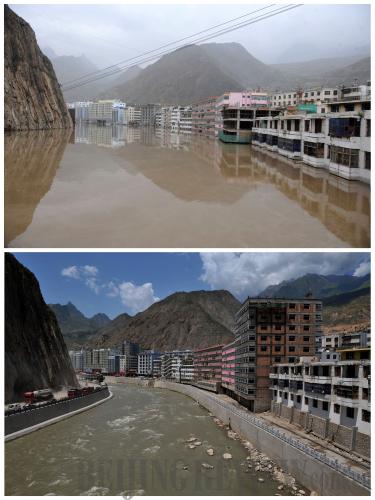|
 |
|
TAMED RIVER: Pai-lung River near Zhugqu County seat on August 13, 2010 (upper) and August 7, 2011 (LIU XIAO) |
Accelerated rebuilding
As Zhugqu residents recover their will to live and move forward, government-sponsored reconstruction of the county has gathered pace.
Last November, the State Council, China's cabinet, published Zhugqu's reconstruction plan, which said houses would be rebuilt and infrastructure will be restored in both urban and rural areas of the county before the end of 2012.
On August 17, 2010, Fan Wude, Secretary of the Committee of the Communist Party of China of Zhugqu County, said the hardest-hit county seat of Zhugqu would be rebuilt in its original location.
Many residents initially opposed the decision and asked questions about the risk of a repeat of the disaster.
"The mudslides did not affect the entire area," Fan said. "It is reasonable to rebuild in the original place. However, Zhugqu is a mountainous area and the bulk of the area's inhabitants live in a narrow plain between two large mountains, this increases the difficulty of the reconstruction."
Zhang Lingjun, chief planner of the Gansu Institute of Urban Planning and Design, said 1.8 square km out of the 2.4-square-km valley of Pai-lung River near the county seat had been set aside as a relatively safe area for reconstruction.
But Zhang said of the 23,000 residents severely affected by last year's mudslide, 15,000 would be relocated to the newly established Fengdie District from the county seat before October 2012 due to limited useable land, and another 8,000 will be moved to Lanzhou, capital city of Gansu.
"There are many difficulties in terms of implementing reconstruction," said Xia Hongmin, Assistant Governor of Gansu who is in charge of the reconstruction project in Zhugqu. "Since Zhugqu is located among the mountains, mitigating harm from future disasters is the top concern of reconstruction efforts."
Xia said Zhugqu's reconstruction would cost 5 billion yuan ($782.72 million). Most of the funds will be supplied by the Central Government, though further donations and bank loans will still be required. The State Council's reconstruction plan specified a quarter of the money invested would be used for the prevention of further geological disasters.
In May, a water supply project was put into use in Zhugqu, which is capable of providing 11,200 tons of running water to citizens in the county seat.
By the end of June, 164 reconstruction programs had been launched in Zhugqu. These programs include rebuilding of houses and public facilities as well as the redevelopment of basic industries in order to provide people with a means of making a living. Construction of meat and fruit product processing plants is underway.
The Northwest Normal University in Lanzhou put forward a plan to integrate the development of a tourist industry into the reconstruction. These plans were adopted by the local government and five national parks will be set up in the vicinity of Zhugqu.
"Zhugqu used to have very beautiful scenery which was damaged by the mudslide, but we are confident we will make Zhugqu more beautiful than before with our efforts," Zhang said.
Feng Duping, a local resident who lost seven of his family members in last year's mudslide, said the reconstruction projects had given him hope. "They (the mudslide victims) are also looking at the changes from heaven. What was once rubble has been turned into construction sites," Feng said. "Reconstruction brings us hope."
Zhugqu Mudslide
The deadly mudslide, which was caused by heavy rainfall and flooding in northwest China's Gansu Province, occurred at midnight on August 8, 2010. Zhugqu County, densely populated with 50,000 people, is the worst hit location. The mudslide soon covered more than 300 low-rise homes and buried at least one village. Half of the urban area in Zhugqu County was trapped in deep water. The mudslide was followed by several heavy rains in the following days, which increased the difficulties of the rescue work. In the end, 1,510 people were killed and 60,000 homes were destroyed. It is the worst mudslide China has faced since 1949.
An outpouring of relief followed the devastating mudslide. Only two days after the tragedy struck, the Gansu Provincial Government announced a plan to distribute a daily living allowance of 150 yuan ($23) a person to disaster-affected residents for 15 days. Forty-seven medical teams, with 779 members, were in Zhugqu treating patients and sterilizing the environment and drinking water. The People's Liberation Army and the People's Armed Police Force dispatched more than 6,000 service people as well as helicopters and rescue boats. China's Red Cross Society received more than 76 million yuan ($12 million) in financial aid for the mudslide-hit region. | 